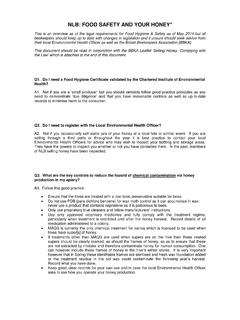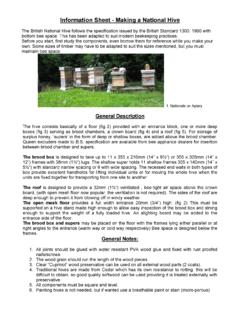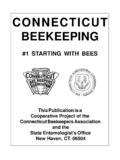Transcription of “A swarm has landed on my neighbour’s land. Can I …
1 1 2014 Andrew Beer bees AND THE LAW by Andrew Beer Talk to NLB on Wednesday 8th October 2014 What You Need to Know Contents 1. Who owns your bees ? 2. A swarm has landed on my neighbour s land. Can I enter it and bring it back? The answer is It depends . 3. The beekeeper and his/her neighbours. 4. Environmental Protection Act 1990 5. The Data Protection Legislation. 6. Insurances. 7. Poisoning. 8. Honey from hive to honeypot. 9. Diseases and Pest Control (England) Order 2006 (as amended). 1. Ownership of bees in your hive At one time there was legal doubt whether or not a beekeeper remained the owner of bees foraging away from a colony or nucleus, and beyond the beekeeper s control.
2 These doubts appear now to have been removed. The determination is very important. For example if a beekeeper is seeking damages against a farmer for poisoning the beekeeper s bees , the claim cannot succeed if the beekeeper were no longer their owner at the time of the poisoning. 2. Swarms. There is much confusion, in my experience, as regards the ownership of swarms. There is also a perception held by some that a beekeeper whose bees swarm has an absolute right to follow them and take them from wherever they go. Finally, collecting swarms may involve risks not only to others and their properties but to the beekeeper himself. Ownership of Swarms Background Note. In earlier times, for all but the very rich, cane sugar and similar crops were unaffordable luxuries, so a swarm or colony provided a vital source of sweetness for the beekeeper and his family.
3 Until the widespread introduction of the moveable frame hive, enabling the beekeeper to adopt swarm prevention measures, the acquisition of swarms was the only means of establishing and maintaining apiaries. The emergence of a swarm was therefore a major event in village life. Servants were kept on the lookout for each swarm as it emerged and pandemonium ensued as soon as it did. Bells were rung, drums were tanged (beaten), mirrors shone for a dual purpose: to induce the swarm to settle where a beekeeper could catch it and, as a general warning to the then many fellow beekeepers, that its former owner wanted it back! What did the law make of all this? More pertinently, what is the legal position today?
4 The law can conveniently be summarised in the swarm Ownership Indicator below. 2 2014 Andrew Beer swarm Ownership Indicator Situation Owner Why? A. bees in your hive; your colony shows evidence of swarm plans larvae in queen cells but no swarm has emerged. You Those in hive belong to you. B. bees out of the hive on colony business not in swarm . You Their intention is to return to the hive. C. bees in swarm and you did not see them emerge. No one. Your ownership is lost when the swarm emerges [but may be regained see E below]. bees have reverted to wild state over which you have no control, and nor does anyone else. D. bees in swarm and you saw them emerge. No one but your right to follow them starts.
5 You can become the owner of the swarm if you can take it under E or F below. A beekeeper who sees his swarm emerge has a right to follow them (see below). E. bees in swarm described in C or D have landed - i) on your land. ii) on somebody else s private property. i) You if you catch them and to the extent that they remain under your control. ii) You if you are allowed access and you catch them, as above. If someone else takes them, whether the property owner or a person authorised by the property owner does so, he/she becomes the owner. (i) and (ii). Control gives you ownership F. You have successfully followed and collected the swarm described in D. You. Based originally on Roman Law a beekeeper who keeps his swarm in view and collects it, can claim it.
6 But if the swarm settles on private land, the right to follow and claim is lost. G. swarm has got away, living wild anywhere, including your land. No one. No one controls it. Access: Problems entering neighbouring land to collect swarms. (a) Swarms on Private Property. Private Property means any land of any kind to which the general public does NOT have right of entry whatever its use and whoever the owner, householder, company or government department H M Treasury. 3 2014 Andrew Beer Beekeepers do not have a right to enter private property to collect swarms. A beekeeper s so-called right to follow and collect a swarm from where it landed , if that land is another s private property, has long been rejected by the English Courts.
7 That means that if your swarm lands, for example, in your neighbour s garden, you have no right, whatever the temptation, to collect it without your neighbour s consent. If your neighbour refuses, that should be the end of the matter. If your neighbour decides to keep it or offer it to someone else, again, you have no right to be compensated. Fortunately, consent is rarely refused; more usually it is a case of your neighbour, nowadays, urging you to remove your bees from my land . Even with consent, care is still needed. First, go onto your neighbour s land and see what equipment will be required and work out a plan of action. In particular, do you need to walk across flowerbeds? Or trim branches?
8 Are there children around? Is damage likely? Warn that the collection may NOT go according to plan. That seemingly easy swarm may take flight and end up anywhere, including down the neighbour s chimney. Then discuss and agree and clear your plan with your neighbour. Once agreed, execute and complete the plan efficiently and leave the neighbour s land as you first agreed. Oh yes, and don t forget honey! No beekeeper, in my view, should ever collect a swarm without offering a jar of honey in return. Works wonders for I regularly give jars of honey to my neighbours in anticipation of the swarms which may later land on their properties and get consent up front . Bribery, if you like, but they love the honey!
9 One of the great advantages of a swarm landing on private property, rather than in a public place (discussed later), is that on private property the swarm collection can usually be organised with the minimum of disturbance to the owner, certainly if the general public is safely out of the way. (b) Swarms in Public Places. By public places I mean places to which the general public has access or which he uses, for example public roads, streets and lanes, communal places and parks. The first rather obvious point is that if the general public can use these places, then so can we beekeepers. The problem is that whilst the general public may want to use, say, a road to get from A to B, we may, to get swarms, need perhaps to bring ladders, block pavements, restrict traffic, pedestrian and vehicular, which may cause serious interruption for as much as a full day.
10 Whilst the powers to do these things are enjoyed by, for example, the police, they are certainly not vested in us beekeepers. These shortcomings are not likely to be a serious setback in rural areas where the ways of the countryside are still embraced (for example tolerance to the regular escape of sheep or cattle from their fields). In my village I have occasionally had to block off a section of pavement and caused churchgoers to use a side entrance to our church, without the slightest complaint. In such cases, the boot is now on the other foot, one becomes Mr Bee , on call to deal with any swarm , bee problem (usually bumble bees ) and the like, and complaints come your way if you don t deal with swarms rather than if you do!








